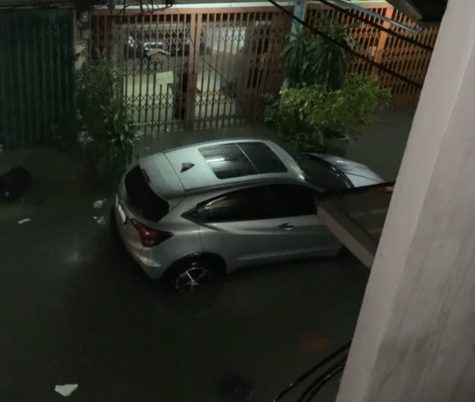Climate change creates more chaos in the United States
Students try to beat the heat by sitting inside for lunch.
September 29, 2022
In light of recent floods, severe heat waves, and droughts relating to global warming around the world, citizens in the US are fearful for the future of our country’s health.
“As temperature increases, you’re seeing water molecules be vaporized so there’s not as much water in the ground, trees, ponds, rivers or any of those things to prevent the spread of fires,” said Zoology and Biomedical Science Teacher Amy Turner Bull.
According to the latest U.S. drought monitor data, about 17% of California is in exceptional drought. The West has become warmer and drier over the past three decades, leading to California experiencing the largest fires in state history in the last five years. While some areas are dealing with major droughts caused by heat waves, other locations are experiencing flooding caused by increased rainfall and melting ice.
Around 1,400 people have been killed in Pakistan due to recent floods caused by record-breaking monsoon rains and melting glaciers from the northern mountain regions. Along with the death toll, an estimated 33 million citizens were affected by having their homes, livestock, crops, and roads washed away.
“My grandparents have had to leave their home and move farther north from where they lived because of the flooding,” said Raahim Nawaz (‘23).
Floods have also impacted residents of Thailand who experienced monsoons like never before. Around 300,000 homes flooded and citizens have had to adapt by putting items like their refrigerator on platforms.
“Last year around July 20th there was a really heavy thunderstorm and the water went into the house. It was up to our calves. It was shocking to us because that’s never happened before. But, luckily our refrigerator was on a platform. The next day we had to drain the whole house,” said Audrey Combs (‘24).

In Thailand, the streets were overrun by a surge of water in Thailand, and some citizens had to evacuate to high land. (Audrey Combs)
With numerous places around the world experiencing flooding, citizens of the US are concerned it could happen here. But, some believe that floods in the US are doubtful.
“It’s possible for some places to flood, however when it does happen it most likely won’t happen in California, and it’s unlikely for it to happen to the extent that it happened in Pakistan. I think that many countries should follow China’s path of creating “sponge cities” where they don’t just try to get rid of the water, but use it for their own purposes like farming. This could limit damage from flooding and make it easier to recover for struggling people,” said Nawaz (‘23).
The benefits of sponge cities are that they can hold more water in rivers, greenery and soil instead of losing it to evaporation, this means droughts are less likely to occur. Studies have shown that natural ways to absorb water are about 50% more affordable than man made solutions, according to the global design firm Arup and the World Economic Forum.
“Until our population slows down, we have too many people on earth needing too many things. Our country must come up with stricter laws on conserving water,” said Turner Bull.







